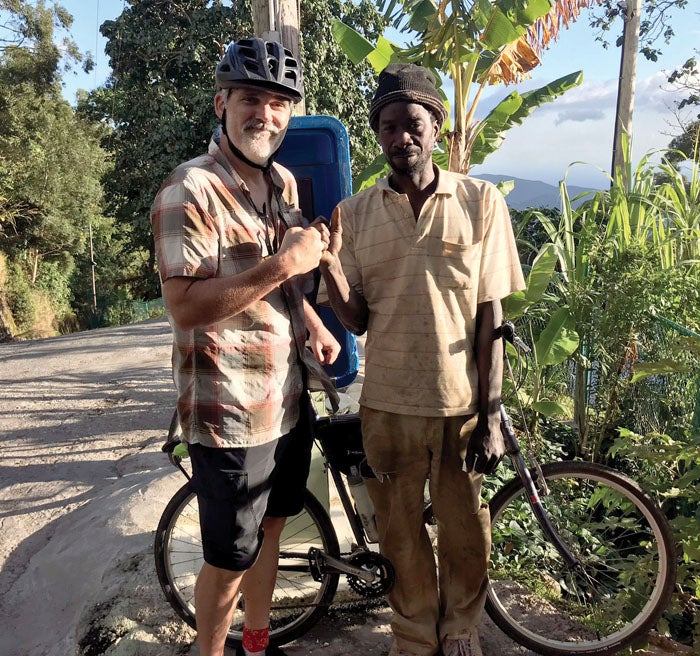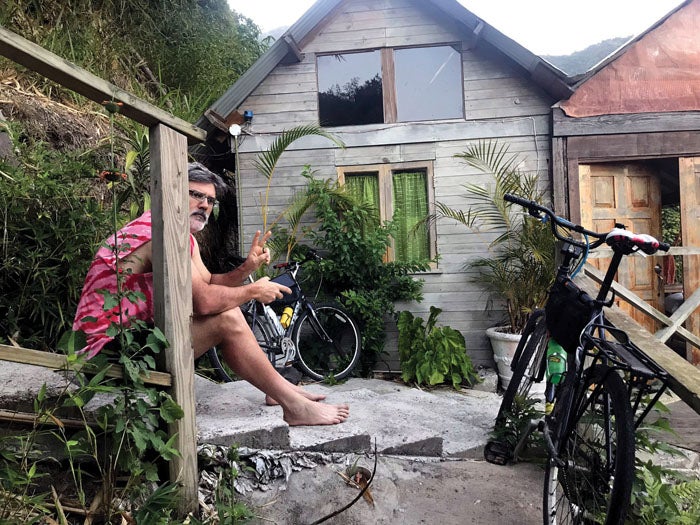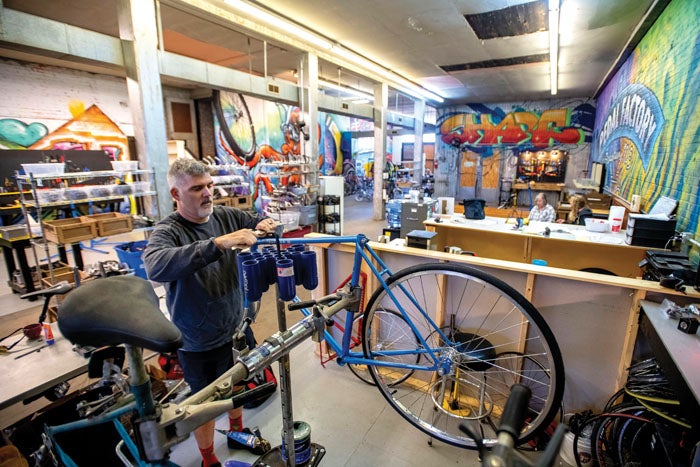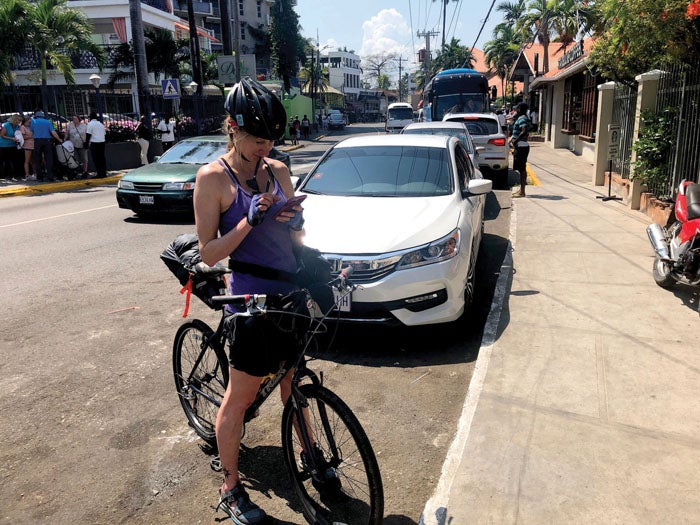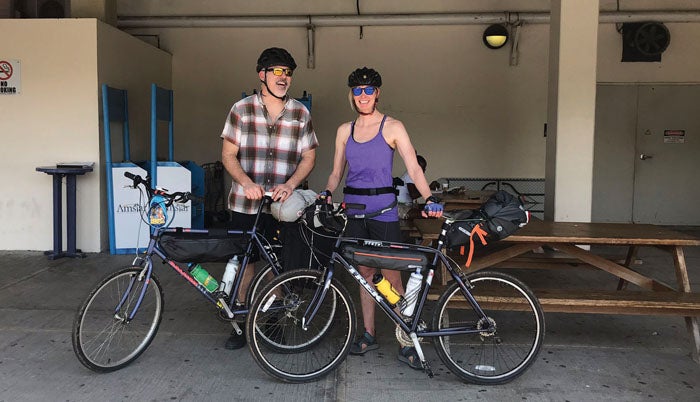Pedal Factory’s Rossers do Jamaica the cheap way, by bike
Published 12:10 am Friday, March 22, 2019
By Maggie Blackwell
For the Salisbury Post
Mary Rosser is the sort of generous person who would want to give something away for her birthday. This year, she did.
For her birthday, Mary and her husband Todd traveled to Jamaica from March 6-13, checking only two large boxes as luggage. They carried clothing and personal items in backpacks.
Inside the boxes were bicycles they’d later build from parts. At the end of the week, they gave the bikes to two people they’d met along the way.
It’s cheaper to take bikes on a plane than one would imagine. They paid $40 each to check the bikes as luggage. Mary says she clearly marked the boxes with, “Bicycle inside, this side up.” She checked the airline’s allowed dimensions and weight for checked items and ensured the boxes met requirements.
“When we got to Jamaica,” Mary says, “We got the boxes at luggage claim and took them outside. We found a picnic table, opened the boxes, put the bikes together, discarded the cardboard, and rode away on the bikes.”
They rode the bikes all week. From Montego Bay to Black River to Treasure Beach to Kingston, the couple explored the island.
Mary says the idea sort of developed on its own.
“There’s this whole trend of bike-packing with nice gear to explore. It’s this huge ‘Instagrammable’ thing. That’s awesome, but you don’t have to spend a ton of money,” Mary said. “These were donation bikes. We put money in tires and a few things, but it was definitely not expensive. We saw people come in with 14,000 things strapped on their bike, it’s their whole life.”
Todd agreed, saying the first inclination for many people is to buy a lot of “stuff” for a bike-packing trip.
“We feel that’s a barrier to entry for people; but it’s not real. It’s a perceived barrier,” Todd said. “No one has to say, ‘How much money am I going to spend?’”
The Rossers set out to take a week vacation on bicycles and do it affordably. They stayed in hostels, cottages and guest houses. One Air B&B destination turned out to be a room in someone’s home, with no A/C and plenty of mosquitoes. The couple laugh as they remember that one.
The Rossers, in their spare time, work at the Pedal Factory on Council Street. It’s a nonprofit that allows folks to put in volunteer hours, helping build bikes. In return for the volunteer hours, people can earn a bicycle of their own. Mary and Todd, however, used their own money on the bikes they took to Jamaica.
They’re downright passionate about biking, and say they see no reason why anyone in the area couldn’t have a free bike.
Jamaica is a third-world country, Mary says, and the only bike-riding they observed was utilitarian — getting from one place to another.
“When we told people we were riding from Montego Bay to the mountains, they told us, ‘Don’t do that,'” Mary recalled.
She and Todd have another good laugh at that one.
They averaged 55 to 70 miles a day on the bikes. Along the way, they met people, saw the sights and smelled the smells.
Mary took three pairs of shorts in her backpack — one to ride in, one for dinners and for sleep. They didn’t have laundry until day six — and only had cold showers until the last day.
“So, we had a smell of our own going on,” they tease.
Mary says they created a great deal of curiosity everywhere they went. People wanted to know why on earth they were riding bicycles. They wanted to help. They offered rides in cars. They gave directions.
“Nobody cares what you’re doing when you’re in a car. When you’re on a bike, everybody — and I mean everybody — wants to know what you’re doing, where you’re going and why,” Mary said. “We had this confusing conversation at least five times a day. We were constantly trying to find where we were going. People were so curious it always turned into a 20-minute conversation.”
On the first day, the Rossers planned to ‘take it easy,’ riding only 44 miles. They went from paved road to dirt road to gravel and through goat herds, all up a mountain. Then they went downhill and reached a paved road with traffic and concrete barriers, which led them back to where they’d started. It was supposed to be a 44-mile day, Todd says, but it turned into a 70-mile day. They worked hard to reach all destinations before dark.
Todd experienced awful leg cramps that day, which hindered progress even more. But they had five or six hours more to ride. So, he soldiered on and they made their destination that evening.
Mary said even back roads had plenty to see, with cell service available everywhere. There are little stores selling drinks and junk food in the most obscure places, she says, and that helped break up the trip.
“On the back roads, we wouldn’t see a car for hours. That was amazing. On busy roads, I was never really scared; we just had to be a little more alert,” she said. “We bought tires for rougher terrain and had no trouble. We did spend a little more for those tires; it was that important.”
Meanwhile, when they ride bikes in Salisbury, people beep their horns in an angry way, as if to say, “Get off my road.” In Jamaica, people would give a little short, “toot toot” to say, “I’m coming through — be cautious!”
Todd says they took extra parts for the bikes in case of trouble, including brake pads, tubes and cables. They only had one flat tire, which occurred five days into the trip. Todd said he wishes they had taken more tools to leave in Jamaica for people to use.
Mary found the first bike recipient in the middle of the trip. They’d ridden up in the mountains and there was a guy selling the famous Blue Mountain coffee outside a restaurant. He asked “all the usual questions,” Mary says, and shared that he’d had a motorbike wreck and had screws in his neck. Mary asked if he would be willing to ride a bike.
She says he replied, “Yeah mon, yeah mon.” He was about her size and fit her bike perfectly.
“Todd came rolling up and I said, ‘Meet Gregory. He’s getting my bike,” Mary recalled.
At the end of their trip Mary met Roderick. He was a big guy, more like Todd in size, and would fit his bike. He was caretaker of a nice house and was really proud of his job. Todd came outside from getting a drink and Mary said, “This is Roderick. He’s getting your bike.”
At the end of the trip, Mary and Todd left their bikes in Kingston and took a van back to Montego Bay for the flight home. Their host at the guesthouse in the Blue Mountains promised to drive to Kingston and get the bikes to deliver them to Gregory and Roderick.
“It was bizarre getting on the bus,” Todd says. “It felt like we weren’t still in Jamaica. We were so removed from everything and couldn’t smell anything.”
Mary says Jamaica isn’t set up for cyclists at all. There aren’t bike lanes or even bike shops. If one is an experienced rider, however, she says it’s an easy place to ride. But one shouldn’t do it on a first trip to the country. The couple says to take extra parts, as there’s nowhere to buy them.
They’re already mulling over where to go next. They plan another trip in the fall and want to do the same thing — ride bikes and give them away before leaving. They’re considering Guatemala or maybe Cuba. Mary notes that Puerto Rico is still recovering from the hurricane and someone might appreciate a bike.
They both say it was a great trip. And Mary is adamant that “you don’t have to stay at a resort to have a good time.”


